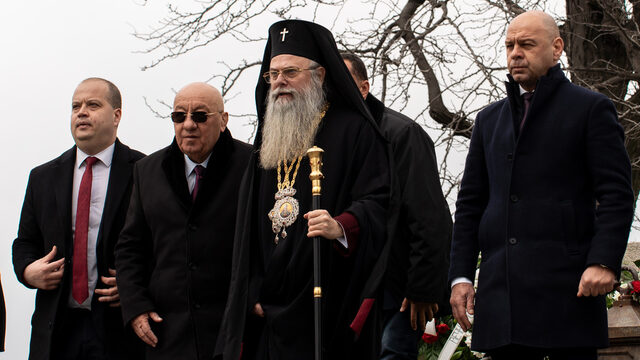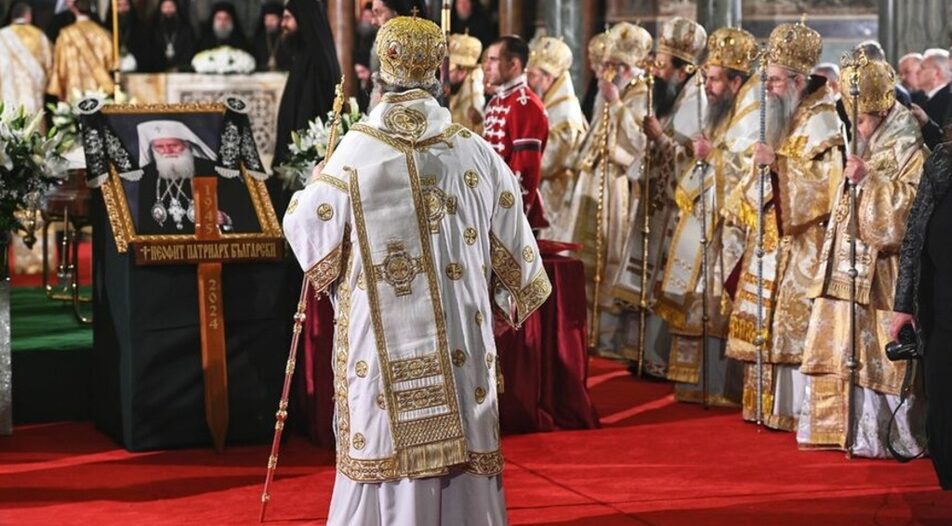After a little more than eleven years at the head of the Bulgarian Orthodox Church (BOC), Patriarch Neofit died on March 13. Father Neofit had been hospitalized in the Military Medical Academy in Sofia since late November 2023, after battling a lung disease, and during that time the quiet struggle for his succession was rumbling along the corridors of the Holy Synod. Over the next four months - the period needed by the Synod to anoint a successor - the clash for power over BOC, with its innumerable properties, unknown riches and influence over the largest religious community in the country will take center stage in public debates.
The news of the Bulgarian Patriarch's passing comes at a turbulent time for the BOC, to say the least. Literally days ago, the Synod saw protests and counter-protests outside its building for the first time in many years over the February 18 decisions to annul the election of the bishop of the Sliven diocese and the controversial ordinance restricting laypeople's access to the election. Also, as we wrote recently, for several months now the BOC has been under audit by the National Revenue Agency (NRA) to determine whether it has unpaid debts to the state, which is the first attempt to penetrate beyond the veils of church property in many years.
Neofit's successor, whoever he may be, will take over a powerful and influential institution that is richer than ever but is riven by internal controversy and finds itself in a troubled time of war between two Orthodox countries - Russia and Ukraine - that is also dividing its own flock.
Elections in the church: what's next
According to the statutes of BOC, during the first week after the death of the Patriarch, the Holy Synod is temporarily headed by the most senior member of its reduced membership, which in this case is Gregory of Veliko Tarnovo. A temporary vicar is then elected whose main role will be to organize the Patriarchal Electoral Council. A new head of the church must be elected within 4 months, i.e. mid-July.
Unlike parliamentary or other secular elections, a very narrow range of people have access to cast their vote in the church. These are about 115 delegates, including five representatives of each diocese (three clergy and two laity), one representative of the three stavropegial (directly subordinate to the synod) monasteries - Rila, Bachkovo and Troyan - chosen by the respective monastic council, two representatives of the diocesan monasteries appointed by the respective diocesan bishop, one representative of the secondary clerical schools and the archpriest. The Diocese of Sofia, which has ten representatives - six clergy and four laity - enjoys a special privilege in the elections, because it elects both the Patriarch and its future Metropolitan.
Curiously, BOC is an exception even among the Orthodox Churches in the way the election of the Patriarch is conducted - namely, that nowhere in the statutes does it prohibit the person responsible for the organization of the Patriarchal Electoral Council from also being a participant in the race, which obviously leaves the possibility of election rigging.
Who can run?
All eligible bishops can apply to be candidates for patriarch themselves, but in a meeting at least seven days before election day the Holy Synod will narrow the choice down to just three. Article 40 of its statute stipulates just four conditions for these candidates: the candidate must be over 50 years of age, be a serving metropolitan of a Bulgarian diocese, have at least five years of experience in this role, and be distinguished by the right thoughts on the Orthodox faith and by faithful observance of the Church's order. From the 13 remaining bishops, only 9 conform to the two quantitative restrictions.
However, these are not all the requirements according to the canon. "In law, including ecclesiastical law, regarding the structure of a legal norm, it is said that it is composed of three interdependent and interrelated parts - hypothesis, disposition and sanction. For various reasons these may not be spelled out. In such a case, we turn to the Code of Canon Law, where the canons say that the candidate for bishop or patriarch must be mentally and physically sound, administratively capable, etc.," says Dilyan Nikolchev, professor of ecclesiastical law. He also notes that the position of Bulgarian patriarch is not for life (i.e. when the patriarch is terminally ill, they are no longer seen as "physically sound" and can be replaced), but this principle has not been observed by the Holy Synod on purpose - likely because of ongoing infighting over who would replace Neofit during his illness.
Nikolay "the Rolex" of Plovdiv: the frontrunner
It is no secret that the leading candidate for the Patriarch's throne is Nikolay, Bishop of Plovdiv. Like many high-flyers from the Bulgarian elite, he is better known by his nickname - "the Rolex", after an expensive handwatch that a journalist noticed on his hand at the very start of his metropolitan career 15 years ago. Nikolay is an odious figure with close links to those with money and power in the largest (and likely the richest) diocese which he never concealed but, on the contrary - paraded. At the time of the last election for Patriarch he had not reached the age of 50, but now he fulfills all conditions for the post.

During his reign in the Plovdiv diocese, Nikolay had used his ecclesiastical authority to proclaim controversial businessmen, such as BSP's Georgi Gergov and ex-State Security agent Peter Mandjukov as "archons", or distinguished members of the church. He has often appeared alongside Russian ambassador Elena Mitrofanova in official ceremonies (although he also took a stance against Russia's invasion of Ukraine - months before the Holy Synod itself) and has strong ties with GERB - former mayor Zdravko Dimitrov is currently appointed as the property manager of the diocese while current mayor Kostadin Dimitrov donated a plot of land for the construction of a church.
However, he is not the only one with connections among political brokers. The Western and Central European Metropolitan Antony, for example, is a member of the board of directors of the Petar Mandjukov Foundation, where he shares the chairmanship with Preslava Karadzhova, the woman next to the lawyer Alexander Angelov, who was heavily involved in the KTB scandal and has traceable ties to Delyan Peevski. The MRF president has had a number of meetings over the past few months with the Holy Synod, demonstrating a willingness for interaction between the two organizations.
Apart from his exceptional activity in secular and ecclesiastical affairs, Nikolay has another distinctive feature that gives him an advantage - he is not a former agent of the Communist-era State Security Service, unlike many of the other high priests. By comparison, the Metropolitan of Veliko Tarnovo, for example, also participated as a founding member of the national council of the organization National Russophile Movement, together with Stara Zagora's Cyprian.
Control of the Holy Synod has political and cultural as well as financial significance. According to rough calculations by Capital weekly, the BOC has had hundreds of millions in revenues over the past six years, which range between 480 million and almost 600 million levs. Given the informal control mechanisms in the Bulgarian Church, the next Patriarch will have serious power over these funds and the way they are spent.
After a little more than eleven years at the head of the Bulgarian Orthodox Church (BOC), Patriarch Neofit died on March 13. Father Neofit had been hospitalized in the Military Medical Academy in Sofia since late November 2023, after battling a lung disease, and during that time the quiet struggle for his succession was rumbling along the corridors of the Holy Synod. Over the next four months - the period needed by the Synod to anoint a successor - the clash for power over BOC, with its innumerable properties, unknown riches and influence over the largest religious community in the country will take center stage in public debates.
The news of the Bulgarian Patriarch's passing comes at a turbulent time for the BOC, to say the least. Literally days ago, the Synod saw protests and counter-protests outside its building for the first time in many years over the February 18 decisions to annul the election of the bishop of the Sliven diocese and the controversial ordinance restricting laypeople's access to the election. Also, as we wrote recently, for several months now the BOC has been under audit by the National Revenue Agency (NRA) to determine whether it has unpaid debts to the state, which is the first attempt to penetrate beyond the veils of church property in many years.












